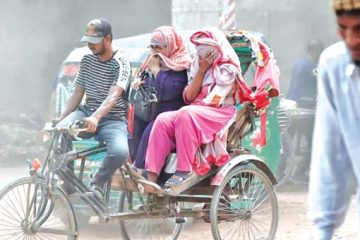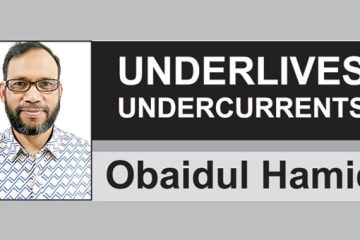Sadiq Ahmed
 Bangladesh is facing serious macroeconomic challenges and I have written a lot explaining them in a series of articles published in The Daily Star and in The Financial Express. In this new article I am going to write specifically about how Bangladesh could address those challenges while also mobilising substantial external financing in a flexible form that will help both the balance of payments and the budget. This kind of financing will also be helpful in lowering inflationary pressures.
Bangladesh is facing serious macroeconomic challenges and I have written a lot explaining them in a series of articles published in The Daily Star and in The Financial Express. In this new article I am going to write specifically about how Bangladesh could address those challenges while also mobilising substantial external financing in a flexible form that will help both the balance of payments and the budget. This kind of financing will also be helpful in lowering inflationary pressures.
It is fashionable in developing countries to blame the International Monetary Fund (IMF) and the World Bank for economic problems at home. Politicians in particular love scapegoating these institutions for their own mismanagement. I am going to argue that for a change the government of Bangladesh can turn around and use these international financial institutions (IFIs) to benefit the country. The trick is to put the country’s interest first, apply the mind to developing an adjustment programme that is good for the country, and then use this adjustment programme to seek flexible balance of payments/budget support financing from the IFIs (including the Asian Development Bank).
As a former director of economic management of the South Asia region of the World Bank, I have managed many budget support operations dealing with a range of countries as varied as Afghanistan, Bangladesh, Nepal, Pakistan and Sri Lanka and a number of states in India (Andhra Pradesh, Bihar, Orissa, Jharkand, Karnataka, and Himachal Pradesh). In each of these cases, the political sell was done on the basis of empowering the concerned finance ministers to be in the driving seat. Being a South Asian, it was easy for me to play that role, but I can understand that it is often an exception than a normal situation in the IFIs. However, Bangladesh does have skills outside the government who can be mobilised on a need basis to help the government in various areas including macroeconomic management. In that spirit, I would like to offer the government a design of a home-grown programme that serves the needs of the country while also likely meeting the standards of the IFIs for financial support.
What are Bangladesh’s current macroeconomic challenges that the government needs to address to put the economy on a sound growth path? In summary, the immediate challenges are to reduce inflation, stabilise the exchange rate, and increase investment to support higher growth without creating further inflationary pressure. The solution requires reducing the growth of money supply to prudent levels, lowering the budget deficit, improving the financing of the budget deficit from inflationary to non-inflationary sources, diversifying and increasing the growth of exports, lowering the growth of imports to normal levels, attracting direct foreign investment, and mobilising flexible foreign financing that helps both the budget and the balance of payments.
Given the objectives and the solutions, the design of the adjustment programme will need to be based on the following core policy actions, which I summarise under two broad categories: macroeconomic policies and structural policies.
The core macroeconomic policy reforms should include: (1) keeping the growth of money supply (technically known as broad money or M2) within prudent limits of 15-16 percent per year for the next 2-3 years; (2) containing the budget deficit to 5 percent of GDP (gross domestic product); (3) raising the tax to GDP ratio by 3 percentage points over the next 2-3 years by closing all the loopholes in income taxation including capital gains tax on real estate and gains from stockmarkets, and also introducing a broad-based property tax system; and (4) cutting back energy subsidy by half from the present unsustainable levels ($4 billion).
The main structural reforms should include: (1) reforming the trade taxation regime including supplementary duties with a view to lowering and rationalising the nominal and effective rates of protection that is hurting export diversification; (2) streamlining annual development programme by systematically reviewing the relevance of the 1,200 plus ongoing investment projects and dropping all projects that are not relevant or consistent with the objectives and targets of the sixth five-year plan; (3) reforming the state-owned commercial banks by setting performance targets and putting them under the supervision of the Bangladesh Bank in order to ensure that they are in full compliance with all prudential norms; (4) decontrolling energy prices in a phased manner over a 2-3-year period so that they are no longer determined by the government but instead they are market-based (gasoline) or set by a regulatory authority (electricity and gas prices) based on international norms; (5) increasing public spending on health, education and social safety net programmes in a manner that is consistent with the growth of tax resources while keeping the budget deficit under 5 percent of the GDP range; and (6) reinvigorating the failed public-private-partnership initiative for infrastructure financing by inviting firms (domestic or international) with internationally competent team and with a demonstrated track record of performance and good governance who could launch and manage this initiative under a fee based contract from the government.
The above programme is in the best interest of the country and is politically feasible. It has only 10 policy actions that are very concrete in terms of being measurable and monitorable. By keeping the number of actions small, the programme is much more implementable and manageable than a programme with many more reforms. It will correct the macroeconomic imbalances while allowing higher investment rates, thereby supporting the growth momentum. The programme is also designed to improve equity by lowering inflation tax and increasing public spending on health, education and safety nets. It will of course hurt the rich by increasing taxes on income and wealth (as it should be) and by reducing open-ended energy subsidies. Some energy subsidies that directly benefit the poor (minimum threshold level of electricity consumption; subsidy on kerosene, etc) can be protected while phasing away most of the energy subsidies over a 2-3-year period.
This programme can be easily taken to the IFIs for flexible financial support in the range of $2.0-$3.0 billion over a 2-3-year period. This way the programme is home-grown and not based on the dictates of the IFIs. A reform programme supported by the IFIs will also likely trigger additional capital flows from private sources in the form of foreign direct investment (FDIs).
It is possible that the IFIs, especially the World Bank, will ask for one additional reform: anti-corruption measures. In principle this should be fine as the Prime Minister has publicly announced that the government has no tolerance for corruption. What the specific actions might be can be discussed and properly formulated for implementation. Actions against corruption will also unlock the impasse on the financing of the Padma Bridge.
It looks and sounds simple. A citizen might ask why is this not done and where is the catch? The catch is whether the political forces are willing to put the country’s interest first before their own interest. This is a tough challenge and I do not have a readymade answer. As a development economist I will only like to draw the attention of the government and other political forces in opposition that they must look around the world and see the economic and political turmoil going on elsewhere. The political fallouts in the Middle Eastern countries and in Africa and the economic turmoil in the US and Europe that is causing citizens to walk out in the street with demonstrations against corporate greed and incompetent public policies are clear indications that citizens globally want their governments to be much more responsive and sympathetic to their needs. A stitch in time saves nine. Letting economic problems fester for too long can be very costly and ought to be avoided.
(Article originally published on The Daily Star)
The author is vice chairman of the Policy Research Institute of Bangladesh. He can be reached at sahmed1952@live.com







